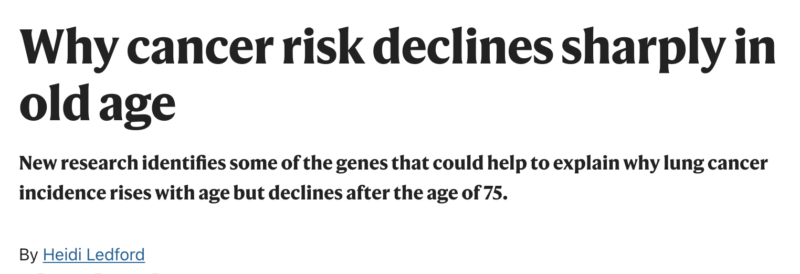Piotr Wysocki recently posted on LinkedIn:
“An intriguing article by Heidi Ledford has recently been published in the NEWS section of Nature. She summarized recent research suggesting that the risk of lung cancer declines sharply in old age due to several factors related to aging, genetic changes, and iron metabolism. The main points are as follows:
- Cancer Risk and Age: Cancer risk generally increases with age due to the accumulation of DNA mutations, but it unexpectedly declines after age 75. This decline has been observed for decades but lacks a clear explanation.
- Tissue Changes with Age: Age-related lung tissue changes can have an inhibitory impact on tumor growth. Older lungs have more scar tissue and reduced regenerative capacity, creating an environment less conducive to the rapid cell growth characteristic of tumors.
- Gene Studies in Mice: Research involving mice with a controlled cancer-causing mutation found that tumors were more extensive and more frequent in younger mice than in older ones. This suggests that specific processes in older tissues might suppress tumor growth.
- Role of NUPR1 and Iron Metabolism: Another study found that aging increases the production of NUPR1 protein, which affects iron metabolism. This makes cells function as in iron deficiency conditions, limiting their capacity for rapid growth. Nupr1 gene inactivation in older mice led to increased iron levels and susceptibility to tumor development, similar to younger mice.
- Implications for Humans: People over 80 have higher levels of NUPR1 in their lung tissue compared to those under 55, suggesting a conserved mechanism across species. However, it’s important to note that results in mice might not fully translate to humans due to differences in the tumor development process .
- Artifact of Decline: Some researchers, argue that the apparent decline in cancer incidence in old age could be an artifact, as autopsy studies often reveal consistent cancer rates across ages. However, it may mean that tumors are less prone to achieve detectable sizes in older patients. Lung cancer remains an exception where incidence genuinely declines even when accounting for autopsy data.
Overall, these findings highlight the complex relationship between aging, genetic factors, and cancer risk, suggesting that aging might play a beneficial role in inhibiting certain types of cancer.”
Why cancer risk declines sharply in old age Cervical Cancer
Authors: Heidi Ledford

Source: Piotr Wysocki/LinkedIn
Piotr Wysocki leads the Clinical Oncology Department at University Hospital and the Faculty of Oncology at Jagiellonian University-Medical College in Krakow, Poland. As an advisor to the Polish Ministry of Health, he shapes the national cancer strategy.
His clinical expertise spans the systemic treatment of breast, gynecologic, and genitourinary cancers, with a focus on developing innovative metronomic chemotherapy-based therapies for advanced cancer patients who have undergone prior treatment.
Read other posts by Piotr Wysocki published on OncoDaily.
